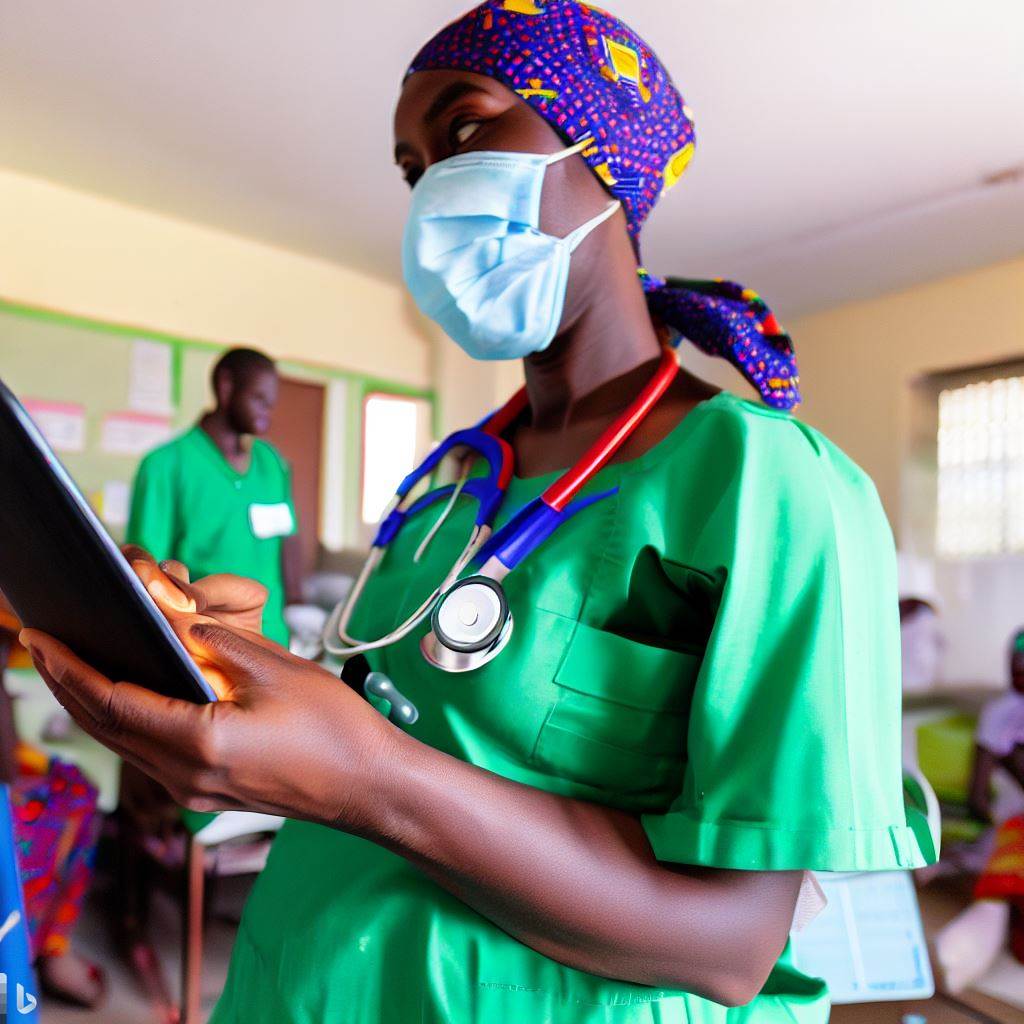The Role of Technology in Nurse Midwifery in Nigeria
Last Updated on August 25, 2023
Introduction
Brief explanation of nurse midwifery in Nigeria
Nurse midwifery in Nigeria refers to the practice of providing healthcare services to women during pregnancy, childbirth, and the postpartum period.
It involves a holistic approach, focusing on the physical, emotional, and social well-being of both the mother and the baby.
Overview of the importance of technology in healthcare
Technology plays a crucial role in healthcare by improving patient care, enhancing accuracy in diagnosis and treatment, and streamlining administrative tasks.
It has transformed the way healthcare is delivered, making it more efficient and accessible.
Thesis statement
The role of technology in nurse midwifery in Nigeria and its impact on improving healthcare services.
In the field of nurse midwifery in Nigeria, technology has been instrumental in improving healthcare services.
It has revolutionized prenatal and childbirth care, enabling better monitoring of maternal and fetal health, facilitating early detection of complications, and enhancing communication between healthcare providers and patients.
Technology has introduced innovative devices and tools such as fetal monitors, ultrasound machines, and electronic health records, which have significantly contributed to the reduction of maternal and infant mortality rates in Nigeria.
It has allowed healthcare professionals to make informed decisions promptly, ensuring timely interventions and proper management of high-risk pregnancies.
Furthermore, technology has facilitated telemedicine, enabling remote consultations, monitoring, and education for both healthcare providers and expectant mothers.
This has been particularly beneficial in rural communities where access to specialized healthcare services is limited.
In the end, the role of technology in nurse midwifery in Nigeria cannot be understated. Its impact on improving healthcare services is evident in the increased efficiency, accuracy, and accessibility of care.
Embracing technological advancements is essential for healthcare professionals to continue providing the best possible care to pregnant women and ensuring positive maternal and infant outcomes.
Current State of Nurse Midwifery in Nigeria
Description of the healthcare system in Nigeria
Nigeria’s healthcare system is characterized by a combination of public and private healthcare providers. Primary healthcare services are offered through primary healthcare centers and dispensaries.
Secondary healthcare services are provided by general hospitals and specialist hospitals. The tertiary level of healthcare is provided by teaching hospitals and federal medical centers.
Challenges faced by nurse midwives in Nigeria
- Nurse midwives in Nigeria often face a shortage of skilled personnel in healthcare facilities.
- Limited access to quality healthcare and poor infrastructure negatively impact nurse midwifery practice.
- Inadequate funding leads to a lack of essential equipment and resources for effective midwifery care.
- Cultural and traditional beliefs sometimes hinder the acceptance and utilization of nurse midwifery services.
- Migration of skilled midwives to other countries due to better opportunities affects the workforce in Nigeria.
Statistics on maternal and neonatal mortality rates in the country
Nigeria grapples with one of the world’s highest maternal mortality rates, approximately 512 deaths per 100,000 live births, alongside a significant neonatal mortality rate of around 37 deaths per 1,000 live births.
The root causes are inadequate access to quality healthcare, poverty, limited education, and a shortage of skilled healthcare professionals, including nurse midwives.
The healthcare system in Nigeria comprises public and private providers at primary, secondary, and tertiary levels, but still faces significant gaps in access, particularly in rural areas.
Nurse midwives encounter multiple challenges, including heavy workloads due to personnel shortages, limited resources hindering effective care, and cultural preferences for traditional birth attendants, contributing to maternal and neonatal complications.
Addressing these issues is crucial. Technology offers potential solutions to enhance nurse midwifery in Nigeria.
Telehealth and mobile applications can improve access to prenatal and postnatal care for underserved populations. Electronic health records can streamline data management, enhancing coordination of care.
Investing in training and education for nurse midwives is essential. Technology-enabled training like online courses and virtual simulation labs can provide accessible and cost-effective learning opportunities.
Advocacy efforts are vital to raise awareness about nurse midwifery’s importance and dispel cultural misconceptions.
Collaborative initiatives with community leaders and local healthcare workers can promote integration and evidence-based practices.
In summary, Nigeria’s nurse midwifery faces challenges due to the healthcare system, limited resources, and cultural beliefs. High maternal and neonatal mortality rates underscore the urgency of action.
Embracing technology through telehealth, electronic health records, and innovative training can enhance nurse midwives’ role and reduce mortality rates.
Read: How to Choose the Best Pediatrician in Nigeria
Introduction of Technology in Nurse Midwifery
The different technological advancements in healthcare
- Electronic Health Records (EHRs)
- Telemedicine and virtual consultations
- Healthcare mobile applications and wearable devices
- Robotic-assisted surgery and minimally invasive procedures
- Artificial intelligence and machine learning in diagnosing and treating patients
Overview of how technology has transformed various aspects of nurse midwifery internationally
- Efficient patient management through EHRs
- Remote monitoring of pregnant women for early detection of complications
- Improved communication with patients through telemedicine
- Enhanced accuracy and precision in surgical procedures using robotics
- AI algorithms assisting in diagnosing fetal abnormalities and predicting outcomes
Comparison of the utilization of technology in developed countries versus Nigeria
The use of technology in nurse midwifery is more prevalent in developed countries due to:
- Higher availability of infrastructure and resources
- Greater investment in healthcare technology
- Advanced training for healthcare professionals
- Easier access to electronic systems and equipment
In contrast, Nigeria faces challenges in implementing technology in nurse midwifery due to:
- Limited financial resources for technological investments
- Inadequate infrastructure and internet connectivity in rural areas
- Lack of awareness and training among healthcare professionals
- Resistance to change and traditional practices
However, Nigeria has made progress in embracing technology in recent years:
- Increase in the adoption of EHRs in some healthcare institutions
- Telemedicine initiatives to reach remote areas with limited access to healthcare
- Partnerships with international organizations to support technological advancements
- Efforts to train nurses and midwives on the use of technology in their practice
Despite these advancements, there is still a significant gap to bridge between developed countries and Nigeria regarding the utilization of technology in nurse midwifery.
Challenges and Opportunities in Implementing Technology in Nurse Midwifery in Nigeria
Challenges in implementing technology:
- Lack of infrastructure and resources
- Resistance to change and traditional practices
- Financial constraints for technological investments
- Limited access to training and education on healthcare technology
Opportunities for overcoming challenges:
- Government support and investment in healthcare technology
- Partnerships with international organizations for technological assistance
- Empowering healthcare professionals through training and education
- Creating awareness and highlighting the benefits of technology in nurse midwifery
Technology has the potential to revolutionize nurse midwifery in Nigeria, but overcoming challenges and bridging the gap with developed countries requires collective efforts from the government, healthcare institutions, professionals, and international collaborations.
Read: Current Challenges Faced by Nurse Midwives in Nigeria

Benefits of Technology in Nurse Midwifery
Improved accuracy and efficiency in patient care
Advanced technology implemented in nurse midwifery practices in Nigeria has led to improved accuracy and efficiency in patient care.
With the use of electronic health records (EHRs), nurses and midwives can easily track and update patient information, ensuring that the right care is provided to each individual.
This reduces the risk of errors and improves overall patient outcomes.
Enhanced communication and information sharing among healthcare professionals
Technology has revolutionized the way healthcare professionals communicate and share information.
With the availability of various communication platforms, nurses and midwives in Nigeria can easily collaborate with other healthcare professionals, share vital patient information, and seek expert advice when needed.
This promotes better coordination and teamwork in delivering quality care.
Increased accessibility to medical records and patient history
Prior to the integration of technology, accessing medical records and patient history in Nigeria was a time-consuming task.
With the implementation of EHR systems, nurses and midwives now have instant access to patient information, including past medical history, medications, allergies, and test results.
This enables them to provide personalized and informed care, ensuring patient safety.
Early detection and prevention of complications through advanced screening techniques
The use of advanced screening techniques, such as ultrasound, fetal monitoring devices, and diagnostic tests, has significantly improved the early detection and prevention of complications in nurse midwifery.
Nurses and midwives can now identify potential issues at an earlier stage, allowing for timely interventions and prevention of adverse outcomes. This has led to improved maternal and infant health in Nigeria.
In fact, technology has brought numerous benefits to nurse midwifery in Nigeria.
From improved accuracy and efficiency in patient care to enhanced communication and access to medical records, these advancements have positively impacted the healthcare system.
The early detection and prevention of complications through advanced screening techniques have also led to better maternal and infant health outcomes.
It is crucial for nurses and midwives to embrace and adapt to technological advancements to provide high-quality and safe care to their patients.
Read: Understanding the Legalities for Nurse Midwives in Nigeria
Utilization of Technology in Nigerian Nurse Midwifery
Examples of technology currently utilized in Nigerian healthcare
- Electronic health records (EHR) for efficient data storage and retrieval.
- Telemedicine platforms enabling remote consultations and monitoring of patients.
- Mobile health applications for healthcare education and awareness.
- Medical devices such as ultrasound machines and fetal monitors for prenatal care.
- Automated medication dispensing systems for accurate and timely medication administration.
Challenges faced in implementing and integrating technology in nurse midwifery
- Limited access to reliable internet connectivity and electricity in rural areas.
- Lack of technological infrastructure and funding for procurement and maintenance.
- Inadequate training and digital skills among healthcare professionals.
- Data security and privacy concerns when using electronic health records and telemedicine.
- Resistance to change and reluctance to adopt new technologies among healthcare staff.
Success stories and positive impacts of technology on healthcare services in Nigeria
- Improved access to healthcare services in remote and underserved areas through telemedicine.
- Enhanced efficiency and accuracy in patient diagnosis, treatment, and monitoring.
- Reduction in maternal and infant mortality rates due to timely interventions facilitated by technology.
- Enhanced patient engagement and empowerment through mobile health applications and health education.
- Increased collaboration among healthcare professionals through digital platforms for knowledge-sharing.
In essence, the utilization of technology in nurse midwifery in Nigeria has brought about numerous benefits and improvements in healthcare services.
Despite challenges in implementation and integration, the examples of technology being currently utilized, such as electronic health records and telemedicine, showcase the potential for technological advancements in Nigerian healthcare.
With increased investment in infrastructure, training, and policy support, the positive impacts of technology can be further maximized to enhance healthcare delivery and outcomes in the country.
Read: Pediatrician Salary Scale in Nigeria: An Overview
Future of Technology in Nurse Midwifery in Nigeria
Potential advancements in technology applicable to nurse midwifery
Wearable devices like smartwatches and fitness trackers can monitor maternal vital signs. Telemedicine platforms enable remote consultations and reduce the need for physical hospital visits.
Mobile applications can provide educational resources and guidance for pregnant women. Advanced ultrasound machines provide more accurate prenatal and postnatal assessments.
Rapid diagnostic tests can quickly detect infectious diseases during pregnancy. Electronic health records streamline data management and improve accessibility of patient information.
Robotics-assisted surgeries offer precise interventions and reduce complications during childbirth. Artificial intelligence can analyze vast amounts of medical data to aid in diagnosis and treatment decisions.
Read: The Path to Becoming a Surgeon in Nigeria
Role of the government and stakeholders in supporting the integration of technology
The government can invest in research and development of technology for nurse midwifery.
Stakeholders, such as healthcare organizations and tech companies, can collaborate to develop practical solutions.
Policies and regulations should be established to ensure the safety and effectiveness of technology in midwifery.
Training programs should be implemented to educate midwives on utilizing technology effectively.
Financial support, grants, and incentives can encourage healthcare providers to adopt and integrate technology.
Predicted improvements in healthcare outcomes with further technological integration
Reduction in maternal and infant mortality rates through early detection and better monitoring. Improved access to healthcare services, especially for remote or underserved areas.
Enhanced efficiency in healthcare delivery, leading to shorter waiting times and improved patient satisfaction.
Increased accuracy in diagnoses, leading to better treatment plans and higher success rates. Better communication and information exchange between healthcare professionals, resulting in coordinated care.
Ability to track and analyze health trends, leading to targeted interventions and improved public health strategies.
Empowerment of pregnant women through access to reliable information and personalized care options.
Potential cost savings for both patients and healthcare providers through reduced hospital stays and unnecessary interventions.
Conclusion
Recap of the importance of technology in nurse midwifery in Nigeria
Technology plays a crucial role in nurse midwifery in Nigeria by enhancing healthcare delivery, improving patient outcomes, and increasing accessibility to quality healthcare services.
Summary of the benefits and challenges faced in utilizing technology
The benefits of utilizing technology in nurse midwifery include increased efficiency, improved communication, and better record-keeping.
However, challenges such as cost, infrastructure limitations, and resistance to change need to be addressed.
Final thoughts on the potential of technology to transform nurse midwifery in Nigeria
Technology has the potential to revolutionize nurse midwifery in Nigeria by bridging the gap between urban and rural areas, improving patient care, and empowering healthcare professionals.
It is essential to invest in technology infrastructure and provide adequate training for healthcare workers to fully harness its potential.


